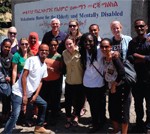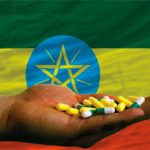Dr. Meltzer, who has worked in Ethiopia, says, “The country has good medical schools, but they have no one to teach rheumatology. There is a rheumatology clinic in Addis Ababa staffed by residents and a nephrologist who has an interest in lupus. These people are just doing they best they can.
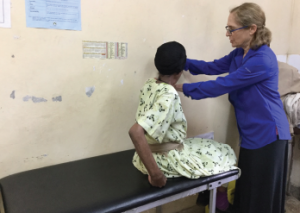
Michele Meltzer at a small hospital in Ethiopia in 2016, demonstrating to physicians how to examine the shoulder in a patient.
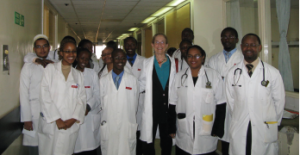
Michele Meltzer at Kenyatta Hospital in Nairobi in 2011 seeing patients in the hospital with medical residents.
“Even in rural clinics, the doctors are usually savvy enough to recognize rheumatic conditions, but they have no place to send these patients. And they are often too fearful of the toxicity of medications to prescribe them. Also, the Ethiopian government has a system [in which] there are only so many drugs that are allowed—and many drugs needed to treat rheumatic diseases are not on that list. We need advocates to approach the government and say, ‘We need these meds.’
“We did an audit of 50 arthritis patients in a rheumatology clinic; we found two problems. First, due to a lack of training, the doctors didn’t use adequate dosages of methotrexate. And even patients who were given adequate doses had lapses in dosing because the drug became unavailable. We need to document that treating our diseases not only improves morbidity and allows people to continue working, but also can prevent mortality. We need this data for the purpose of advocacy.”
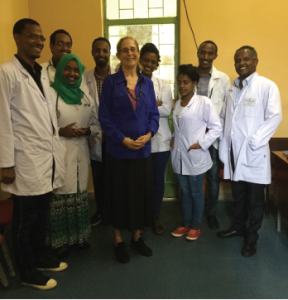
Michele Meltzer with residents and attending physicians in a small hospital in Ethiopia. She had just delivered a lecture on rheumatology basics.
How does all of this affect the physicians who are charged with caring for patients? Dr. Meltzer says, “If you are struggling with a huge patient load—and you’re not even a rheumatologist—what do you do? Take time and see three patients per hour or hurry through each meeting and see 20 patients per hour? These healthcare workers are very burdened, and there is no place for them to go to discuss these issues. The pay is low, so doctors often have a private practice on the side to support their families.”
As for the patients in Kenya, says Dr. Meltzer, she and her colleagues found that a lupus support group in Nairobi reduced the psychosocial stressors and improved patients’ understanding of their disease. “In Nairobi, these groups work very well. So many patients have no understanding of their disease—this is turning out to be a good mechanism to educate people.”
